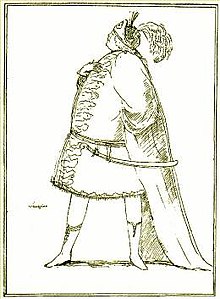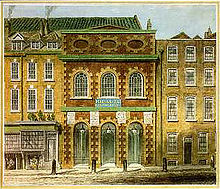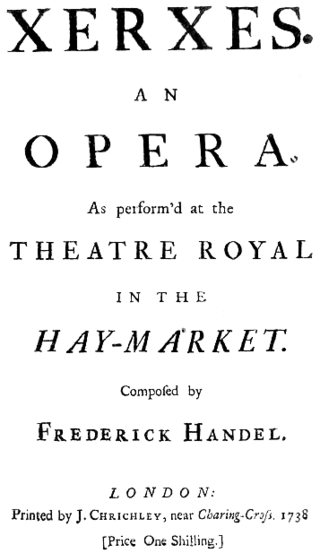
Serse is an opera seria in three acts by George Frideric Handel. It was first performed in London on 15 April 1738. The Italian libretto was adapted by an unknown hand from that by Silvio Stampiglia (1664–1725) for an earlier opera of the same name by Giovanni Bononcini in 1694. Stampiglia's libretto was itself based on one by Nicolò Minato (ca.1627–1698) that was set by Francesco Cavalli in 1654. The opera is set in Persia about 470 BC and is very loosely based upon Xerxes I of Persia. Serse, originally sung by a mezzo-soprano castrato, is now usually performed by a female mezzo-soprano or countertenor.

Opera seria is an Italian musical term which refers to the noble and "serious" style of Italian opera that predominated in Europe from the 1710s to about 1770. The term itself was rarely used at the time and only attained common usage once opera seria was becoming unfashionable and beginning to be viewed as something of a historical genre. The popular rival to opera seria was opera buffa, the 'comic' opera that took its cue from the improvisatory commedia dell'arte. An opera seria had a historical or Biblical subject, whereas an opera buffa had a contemporary subject.

Rodelinda, regina de' Longobardi is an opera seria in three acts composed for the first Royal Academy of Music by George Frideric Handel. The libretto is by Nicola Francesco Haym, based on an earlier libretto by Antonio Salvi. Rodelinda has long been regarded as one of Handel's greatest works.

Flavio, re de' Longobardi is an opera seria in three acts by George Frideric Handel. The Italian-language libretto was by Nicola Francesco Haym, after Matteo Noris's Flavio Cuniberto. It was Handel's fourth full-length opera for the Royal Academy of Music. Handel had originally entitled the opera after the character of Emilia in the opera.
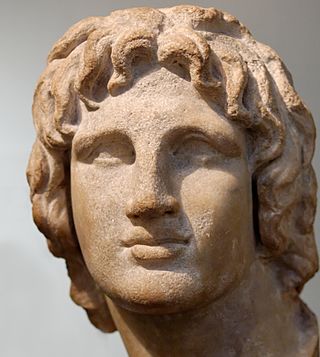
Alessandro, is an opera composed by George Frideric Handel in 1726 for the Royal Academy of Music. Paolo Rolli's libretto is based on the story of Ortensio Mauro's La superbia d'Alessandro. This was the first time the famous singers Faustina Bordoni and Francesca Cuzzoni appeared together in one of Handel's operas. The original cast also included Francesco Bernardi who was known as Senesino.

Tamerlano is an opera seria in three acts by George Frideric Handel. The Italian libretto was by Nicola Francesco Haym, adapted from Agostino Piovene's Tamerlano together with another libretto entitled Bajazet after Nicolas Pradon's Tamerlan, ou La Mort de Bajazet. The opera was staged by the Royal Academy of Music in the King's Theatre at the Haymarket, London.

Teseo is an opera seria with music by George Frideric Handel, the only Handel opera that is in five acts. The Italian-language libretto was by Nicola Francesco Haym, after Philippe Quinault's Thésée. It was Handel's third London opera, intended to follow the success of Rinaldo after the unpopular Il pastor fido.

Riccardo primo, re d'Inghilterra is an opera seria in three acts written by George Frideric Handel for the Royal Academy of Music (1719). The Italian-language libretto was by Paolo Antonio Rolli, after Francesco Briani's Isacio tiranno, set by Antonio Lotti in 1710. Handel wrote the work for the Royal Academy's 1726–27 opera season, and also as homage to the newly crowned George II and the nation where Handel had just received citizenship.

Scipione, also called Publio Cornelio Scipione, is an opera seria in three acts, with music composed by George Frideric Handel for the Royal Academy of Music in 1726. The librettist was Paolo Antonio Rolli. Handel composed Scipione whilst in the middle of writing Alessandro. It is based on the life of the Roman general Scipio Africanus. Its slow march is the regimental march of the Grenadier Guards and is known for being played at London Metropolitan Police passing out ceremonies.

Sosarme, re di Media is an opera by George Frideric Handel written in 1732 for the King's Theatre in the Haymarket, London, where it ran for 12 performances. The text was based on an earlier libretto by Antonio Salvi, Dionisio, Re di Portogallo, and adapted by an unknown writer. The original setting of Portugal was changed to Sardis in Lydia.

Siroe, re di Persia, is an opera seria in three acts by George Frideric Handel. It was his 12th opera for the Royal Academy of Music and was written for the sopranos Francesca Cuzzoni and Faustina Bordoni. The opera uses an Italian-language libretto by Nicola Francesco Haym, after Metastasio's Siroe. Like many of Metastasio's libretti, it was also set by Handel's contemporaries, e.g. by Leonardo Vinci, Antonio Vivaldi and Johann Adolph Hasse. Pasquale Errichelli's setting of the libretto premiered in the year of Handel's death.
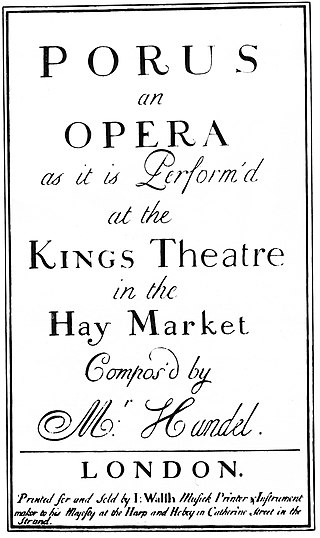
Poro, re dell'Indie is an opera seria in three acts by George Frideric Handel. The Italian-language libretto was adapted from Alessandro nell'Indie by Metastasio, and based on Alexander the Great's encounter with Porus in 326 BC. The libretto had already been set to music by Leonardo Vinci in 1729 and was used as the text for more than sixty operas throughout the 18th century.

Floridante is an opera seria in three acts by George Frideric Handel. The Italian-language libretto was by Paolo Antonio Rolli after Francesco Silvani's libretto for Marc'Antonio Ziani dramma per musica La costanza in trionfo of 1696.

Arianna in Creta is an opera seria in three acts by George Frideric Handel. The Italian-language libretto was adapted by Francis Colman from Pietro Pariati's Arianna e Teseo, a text previously set by Nicola Porpora in 1727 and Leonardo Leo in 1729.

Lotario is an opera seria in three acts by George Frideric Handel. The Italian-language libretto was adapted from Antonio Salvi's Adelaide.The opera was first given at the King's Theatre in London on 2 December 1729.

Muzio Scevola is an opera seria in three acts about Gaius Mucius Scaevola. The Italian-language libretto was by Paolo Antonio Rolli, adapted from a text by Silvio Stampiglia. The music for the first act was composed by Filippo Amadei, the second act by Giovanni Bononcini, and the third by George Frideric Handel. Collaborations of groups of composers were common in the 18th century, though this is the only one done in London. Bononcini had written the music for two earlier treatments of this story on his own, works dating from 1695 and 1710.
Ezio is an opera eroica or "heroic" opera in 3 acts by Gaetano Latilla. The opera uses an Italian-language libretto by Pietro Metastasio. Metastasio's libretto was partly inspired by Jean Racine's play Britannicus and had earlier been set to music by George Frideric Handel in 1732. The work's protagonist is the fifth-century AD Roman general Flavius Aetius, returned from his victory over Attila. Latilla's version premiered at the Teatro di San Carlo in Naples on 10 July 1758. The composer both directed and conducted the production and Vincenzo Re designed the sets used in the premiere. The cast included Giovanni Carestini in the title role, Caterina Gabrielli as Fulvia, Maddalena Galli as Onoria, Caterina Galli as Valentiniano III, Gregorio Babbi as Massimo, and Antonio Ambrogi as Varo.

Ezio is an eighteenth-century Italian opera in 3 acts by the Czech composer Josef Mysliveček. It was the composer's first setting of a libretto by the Italian poet Metastasio that was first performed with music by Pietro Auletta in 1728, one of the most popular of the Metastasian librettos in Mysliveček's day. The story is based on incidents from the lives of the 5th-century Roman emperor Valentinian III and his general Aetius. For a performance in the 1770s, it would only be expected that a libretto of such age would be abbreviated and altered to suit contemporary operatic taste. The cuts and changes in the text made for the 1775 performance of Mysliveček's opera are not attributable. All of Mysliveček's operas are of the serious type in Italian language referred to as opera seria.

Ezio is an eighteenth-century Italian opera in 3 acts by the Czech composer Josef Mysliveček. It was the composer's second setting of a libretto by the Italian poet Metastasio that was first performed in 1728, one of the most popular of the Metastasian librettos in Mysliveček's day. The story is based on incidents from the lives of the 5th-century Roman emperor Valentinian III and his general Aetius. For a performance in the 1770s, it would only be expected that a libretto of such age would be abbreviated and altered to suit contemporary operatic taste. The cuts and changes in the text made for the 1777 performance of Mysliveček's opera are not attributable. All of Mysliveček's operas are of the serious type in Italian language referred to as opera seria.
Ezio is an opera seria from the Early Classical Period in three acts composed by Christoph Willibald Gluck, staged in 1750 and revised in 1763.

